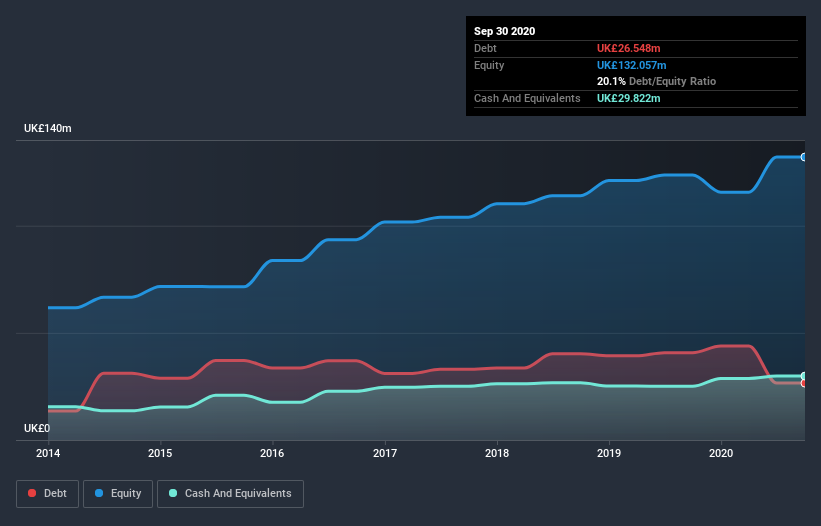
Warren Buffett famously said, 'Volatility is far from synonymous with risk.' So it seems the smart money knows that debt - which is usually involved in bankruptcies - is a very important factor, when you assess how risky a company is. Importantly, Trifast plc (LON:TRI) does carry debt. But the real question is whether this debt is making the company risky.
What Risk Does Debt Bring?
Generally speaking, debt only becomes a real problem when a company can't easily pay it off, either by raising capital or with its own cash flow. In the worst case scenario, a company can go bankrupt if it cannot pay its creditors. However, a more frequent (but still costly) occurrence is where a company must issue shares at bargain-basement prices, permanently diluting shareholders, just to shore up its balance sheet. By replacing dilution, though, debt can be an extremely good tool for businesses that need capital to invest in growth at high rates of return. The first thing to do when considering how much debt a business uses is to look at its cash and debt together.
View our latest analysis for Trifast
What Is Trifast's Debt?
The image below, which you can click on for greater detail, shows that Trifast had debt of UK£26.5m at the end of September 2020, a reduction from UK£40.7m over a year. But on the other hand it also has UK£29.8m in cash, leading to a UK£3.27m net cash position.

A Look At Trifast's Liabilities
Zooming in on the latest balance sheet data, we can see that Trifast had liabilities of UK£38.9m due within 12 months and liabilities of UK£42.2m due beyond that. On the other hand, it had cash of UK£29.8m and UK£49.3m worth of receivables due within a year. So its liabilities total UK£2.04m more than the combination of its cash and short-term receivables.
Having regard to Trifast's size, it seems that its liquid assets are well balanced with its total liabilities. So it's very unlikely that the UK£209.1m company is short on cash, but still worth keeping an eye on the balance sheet. While it does have liabilities worth noting, Trifast also has more cash than debt, so we're pretty confident it can manage its debt safely.
The modesty of its debt load may become crucial for Trifast if management cannot prevent a repeat of the 58% cut to EBIT over the last year. When a company sees its earnings tank, it can sometimes find its relationships with its lenders turn sour. The balance sheet is clearly the area to focus on when you are analysing debt. But ultimately the future profitability of the business will decide if Trifast can strengthen its balance sheet over time. So if you're focused on the future you can check out this free report showing analyst profit forecasts.
But our final consideration is also important, because a company cannot pay debt with paper profits; it needs cold hard cash. Trifast may have net cash on the balance sheet, but it is still interesting to look at how well the business converts its earnings before interest and tax (EBIT) to free cash flow, because that will influence both its need for, and its capacity to manage debt. Over the most recent three years, Trifast recorded free cash flow worth 59% of its EBIT, which is around normal, given free cash flow excludes interest and tax. This free cash flow puts the company in a good position to pay down debt, when appropriate.
Summing up
While it is always sensible to look at a company's total liabilities, it is very reassuring that Trifast has UK£3.27m in net cash. So we don't have any problem with Trifast's use of debt. The balance sheet is clearly the area to focus on when you are analysing debt. However, not all investment risk resides within the balance sheet - far from it. For example, we've discovered 2 warning signs for Trifast that you should be aware of before investing here.
If, after all that, you're more interested in a fast growing company with a rock-solid balance sheet, then check out our list of net cash growth stocks without delay.
If you’re looking to trade Trifast, open an account with the lowest-cost* platform trusted by professionals, Interactive Brokers. Their clients from over 200 countries and territories trade stocks, options, futures, forex, bonds and funds worldwide from a single integrated account. Promoted
Valuation is complex, but we're here to simplify it.
Discover if Trifast might be undervalued or overvalued with our detailed analysis, featuring fair value estimates, potential risks, dividends, insider trades, and its financial condition.
Access Free AnalysisThis article by Simply Wall St is general in nature. It does not constitute a recommendation to buy or sell any stock, and does not take account of your objectives, or your financial situation. We aim to bring you long-term focused analysis driven by fundamental data. Note that our analysis may not factor in the latest price-sensitive company announcements or qualitative material. Simply Wall St has no position in any stocks mentioned.
*Interactive Brokers Rated Lowest Cost Broker by StockBrokers.com Annual Online Review 2020
Have feedback on this article? Concerned about the content? Get in touch with us directly. Alternatively, email editorial-team@simplywallst.com.
About LSE:TRI
Trifast
Manufactures and distributes industrial fasteners and category C components in the United Kingdom, Ireland, Europe, North America, and Asia.
Good value with reasonable growth potential.
Market Insights
Community Narratives




